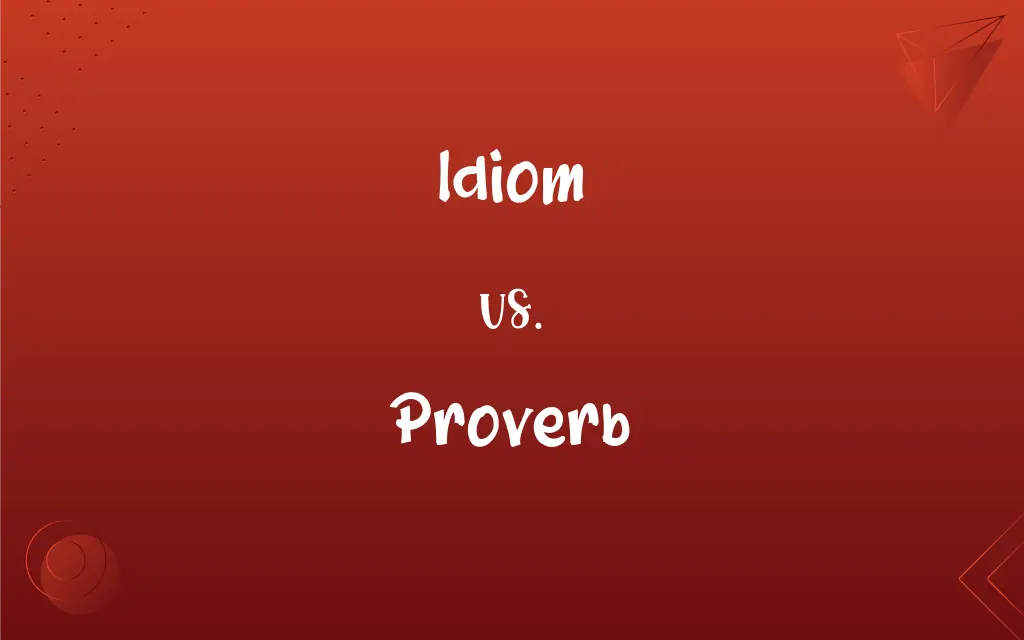Idiom vs. Proverb: What's the Difference?
Edited by Aimie Carlson || By Harlon Moss || Updated on October 19, 2023
An idiom is a phrase with a non-literal meaning; a proverb is a brief popular saying expressing wisdom or truth.

Key Differences
An idiom is a unique expression of a particular language, typically comprising a combination of words that doesn't directly translate to its actual meaning. For instance, "break a leg" is an idiom meaning "good luck." A proverb, on the other hand, is a well-known saying that imparts wisdom or gives advice, such as "actions speak louder than words."
While idioms are colorful expressions that can often seem illogical to non-native speakers due to their non-literal nature, proverbs are often accepted as universal truths across cultures. For instance, the idiom "kick the bucket" might confuse those unfamiliar with English, while the proverb "honesty is the best policy" offers clear guidance.
The use of idioms adds flair and local nuance to language, making conversations richer and more vibrant. Conversely, proverbs serve to summarize common experiences or beliefs in a memorable way, allowing for shared understanding and values. An idiom like "biting off more than you can chew" paints a vivid picture, while a proverb like "a stitch in time saves nine" offers cautionary advice.
Idioms often emerge from cultural, historical, or societal contexts, and their meanings can change over time. Proverbs, however, have stood the test of time, remaining consistent in their advice and wisdom. For example, while the origins of the idiom "spill the beans" might be debated, the proverb "birds of a feather flock together" has long been used to describe the tendency of like-minded people to associate.
Both idioms and proverbs enrich language, albeit in different ways. Idioms provide a glimpse into the cultural quirks of a language, while proverbs offer age-old wisdom that resonates across generations.
ADVERTISEMENT
Comparison Chart
Nature
Non-literal expression.
Saying expressing wisdom/truth.
Purpose
Adds flair and nuance to language.
Offers guidance or reflects common beliefs.
Translatability
Often culturally specific.
More universally understood.
Examples
"Bite the bullet," "under the weather."
"Better safe than sorry," "early bird gets the worm."
Origins
Emerge from cultural, historical contexts.
Time-tested reflections on human experience.
ADVERTISEMENT
Idiom and Proverb Definitions
Idiom
A culturally specific expression with a figurative meaning.
Pulling someone's leg means joking with them.
Proverb
A traditional adage expressing common beliefs or observations.
Two wrongs don't make a right advises against revenge.
Idiom
A phrase whose meaning isn't directly inferred from its words.
It's raining cats and dogs means it's raining heavily.
Proverb
A time-honored maxim offering wisdom or insight.
A watched pot never boils means time feels longer when waiting.
Idiom
A linguistic form or sequence of words with a unique meaning in a language.
On cloud nine means feeling extremely happy.
Proverb
A concise statement, often metaphorical, reflecting societal values.
The pen is mightier than the sword means writing can be more powerful than force.
Idiom
A set of words with a particular meaning distinct from their literal interpretation.
Throw in the towel means to give up.
Proverb
A short, well-known saying expressing a general truth or advice.
Every cloud has a silver lining means every bad situation has a positive aspect.
Idiom
A non-literal phrase adding color and depth to language.
Kick the bucket means to die.
Proverb
A universally recognized saying offering guidance.
When in Rome, do as the Romans do means adopt local customs when in a new environment.
Idiom
A speech form or an expression of a given language that is peculiar to itself grammatically or cannot be understood from the individual meanings of its elements, as in keep tabs on.
Proverb
A short pithy saying in frequent and widespread use that expresses a basic truth or practical precept.
Idiom
The specific grammatical, syntactic, and structural character of a given language.
Proverb
Proverbs (used with a sing. verb) See Table at Bible.
FAQs
Are proverbs specific to certain cultures?
While some proverbs are culture-specific, many convey universal truths and are understood cross-culturally.
What is an idiom in simple terms?
An idiom is a phrase with a unique, non-literal meaning.
How are idioms different from slang?
While both are informal, idioms have established meanings in a language, whereas slang terms are more fleeting and can change over time.
How does a proverb typically convey its message?
A proverb conveys a message by expressing a general truth or piece of advice.
Can the meaning of an idiom be easily guessed by its words?
No, idioms often have meanings that can't be directly inferred from their individual words.
Do idioms always make sense in translations?
No, idioms often lose their figurative meaning when directly translated into another language.
Can idioms have variations?
Yes, idioms can have slight variations in wording or usage across regions or cultures.
What's the main purpose of a proverb in language?
The main purpose of a proverb is to impart wisdom or share common beliefs in a succinct manner.
Can a saying become a proverb?
Yes, if a saying gains widespread acceptance and conveys universal truth or wisdom, it can become a proverb.
Can a proverb be considered an idiom?
While both are fixed phrases, not all proverbs are idioms; proverbs give advice or express truth, while idioms have non-literal meanings.
What makes a proverb stand the test of time?
Its ability to convey universal truths or wisdom makes a proverb relevant across generations.
Why might an idiom sound strange to a non-native speaker?
Because idioms have figurative meanings, they can seem illogical or confusing when taken literally.
Can the meaning of a proverb change over time?
While the wording remains consistent, the interpretation or relevance of a proverb can shift with societal changes.
Are idioms used in formal writing?
Idioms are often avoided in formal writing to maintain clarity, but they can be used effectively in creative or informal contexts.
Is it essential to understand proverbs in a language?
While not essential, understanding proverbs can provide deeper insights into a culture's values and beliefs.
Why are proverbs important in literature?
Proverbs provide cultural insights, reflect societal values, and can enhance the thematic depth of a literary work.
How do idioms enhance language?
Idioms add color, depth, and local nuance to language, making conversations more vibrant and relatable.
How are idioms created?
Idioms often emerge from cultural, historical, or societal contexts and evolve over time.
Are proverbs used in everyday speech?
Yes, proverbs are commonly used in everyday speech to offer advice or make observations.
How can learning idioms enhance language proficiency?
Learning idioms helps in understanding cultural nuances and makes one sound more like a native speaker.
About Author
Written by
Harlon MossHarlon is a seasoned quality moderator and accomplished content writer for Difference Wiki. An alumnus of the prestigious University of California, he earned his degree in Computer Science. Leveraging his academic background, Harlon brings a meticulous and informed perspective to his work, ensuring content accuracy and excellence.
Edited by
Aimie CarlsonAimie Carlson, holding a master's degree in English literature, is a fervent English language enthusiast. She lends her writing talents to Difference Wiki, a prominent website that specializes in comparisons, offering readers insightful analyses that both captivate and inform.
































































